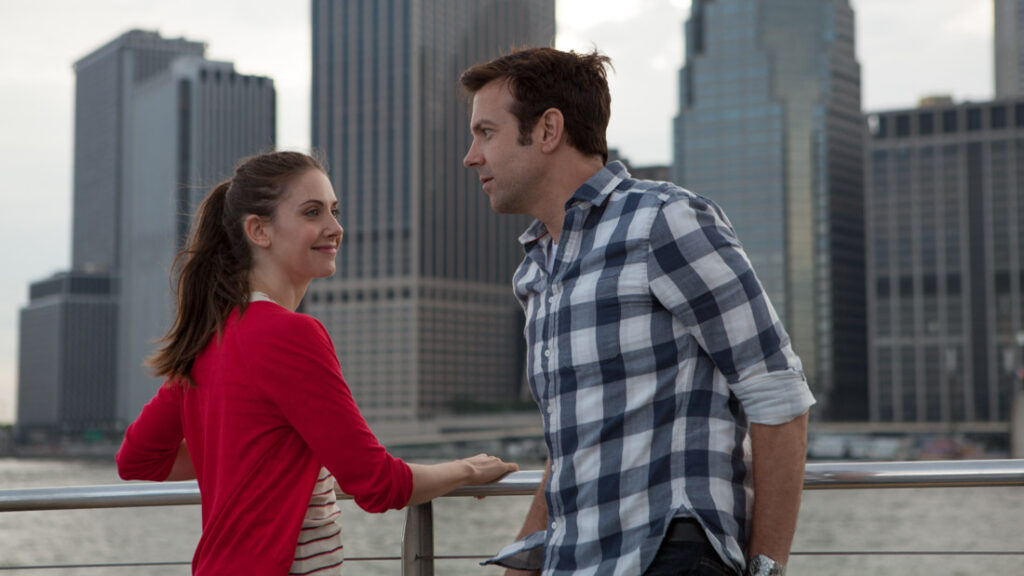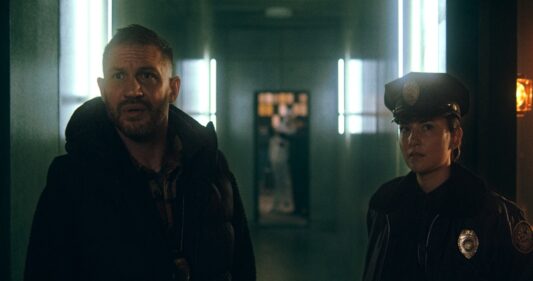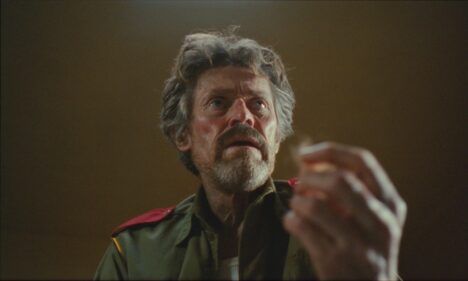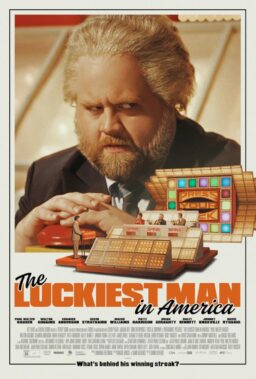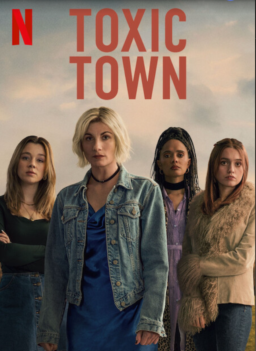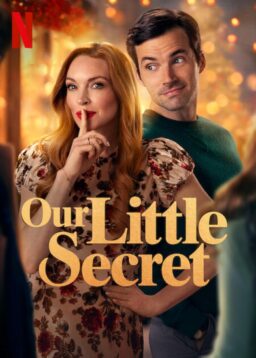Writer/director
Leslye Headland’s
new romantic comedy “Sleeping with Other People” has been appropriately
familiarized to Sundance audiences as “‘When Harry Met Sally’ for Assholes” by the director herself at the world
premiere. It’s
a New York love story in which Jason Sudeikis’ Jake
and Alison Brie’s
Lainey work to maintain the one healthy relationship in their lives: their friendship. The catch is that they both have a tendency to fall into destructive
promiscuity, with Jake an outed womanizer, and Lainey a woman who can’t
stop cheating on her boyfriends with her manipulative college fling Matthew
(Adam Scott). “Sleeping with Other People” is an impurely hilarious “friends
with no benefits” tale, emboldened with bubbly chemistry between Sudeikis and
Brie.
A progressive genre
film that treats these romantic comedy antiheroes with heart, Headland’s
hilarious follow-up to 2012’s “Bachelorette” boasts festive turns from an
energetic supporting cast that includes Jason Mantzoukas, Natasha Lyonne, Amanda
Peet, Katherine Waterston and Andrea Savage. In its exciting refresh to a film
genre that currently endures mostly on non-cable TV shows, “Sleeping with Other
People” knows the form of the rom-com, but challenges its rules. Headland’s
charming narrative eschews expected moralization for its procreant characters
that audiences are meant to love, and expresses itself with open sexuality that
comes without the context of cheap raunch.
The day after the
film’s
world premiere at the Sundance Film Festival, RogerEbert.com sat down with
Headland and Sudeikis to talk openly about their different kind of romantic
comedy. Sudeikis had a humble tone when speaking about his new placement into
the genre, while Headland paralleled her film’s fervor to challenge the
squeakier preconceptions of relationships as shown through funny love
stories. They discussed Jason’s newfound potential
as a romantic lead, the way in which they both toed the story’s
risky new morality, how the film takes after Billy Wilder’s “The
Apartment” and more.
Leslye, what was it that appealed to you about casting
Jason as your romantic lead, especially as his character is a dicier version of
the male love interest?
LESLYE HEADLAND: When
I met Jason I just felt like, “Why has this guy not been the lead in a romantic
comedy?” It just didn’t make any sense to me. Jason had done
some of them, but not in the sense of “here’s
the guy.” And this whole movie is based on whether you fall in love with this
guy, because if the audience doesn’t fall in love with
him, they’re
not going to believe that the girl fell in love with him. And that’s
sort of one of the big problems I think with where the genre is right now. To
me, the people are just not that intriguing. They’re
usually people that have no problems, or their problem is that they’re
a schlubby guy and they like a pretty girl. So it really was just a vibe thing.
I met [Jason] and I was just like, I don’t understand why this
guy is not in “The Apartment,” which is one of my favorite films, and one that
we referenced a lot when we were making this film, or “When Harry Met
Sally.” I just feel like the genre shifted somehow with the male leads, and it
wasn’t
the Cary Grants and these very funny, very handsome, very charming guys, that
you as like a little girl watching “The Philadelphia Story” or “Bringing Up
Baby” were watching. You don’t sit there and watch
these newer movies and think, “Oh my gosh, I’m
so in love with this guy.” As much as I love “Knocked Up” and as much as I love
his movies, I am not in love with Seth Rogen. I’m
sorry, I love the guy, I think he’s very funny, I
definitely see all of his movies, but there’s
no part of me that wants to fuck that guy. As relatable as a Seth Rogen
character is, I just thought that as a woman, as a female filmmaker, and
somebody that really wanted to make a romantic comedy, I just felt very lucky.
I felt like I had found something before anybody else did. Even though he was very
successful, he wasn’t the big guy. I don’t understand why
women aren’t
in the audience swooning. Like, I’m going, “Here he is,
here’s
the dude!”
Jason, you’ve done sex comedies before, like “Hall Pass” and “A Good Old Fashioned Orgy” that have a similar
openness as with “Sleeping with Other People.” But you haven’t really lead a romantic comedy. Is that something that
just hadn’t happened yet?
JASON SUDEIKIS: I was
lucky to have Tina [Fey] hire me on to play her love interest early on with “30
Rock,” and it was in its first season before it would have gotten a much bigger
star to play the part as they continued to do as the show became successful and
whatnot. But I always loved scenes where people fell in love, like in sketches.
I wrote scenes that had that at “SNL.” Like I tried “An Affair to Remember,”
when Annette Bening hosted. I wrote a scene where I see her at the top of the
Empire State Building. I turn around and I kiss her, and when we pull apart I
realize it’s
not her, it’s
not who I thought it would be. She was waiting for a different guy, and I say, “Well,
should we give this a shot now?”
But I can’t
really answer it. I don’t know what I’m doing, I’m
only seeing it out through these eyes, and I would argue that the reason is
probably that people wouldn’t find me attractive
enough, or that that would be my baggage and hang-ups on it. But I don’t
know—small teeth, no cheekbones? Not to highlight my insecurities, but I don’t
know why, and I don’t know why Leslie did. I don’t
see it.
Your character Jake is outed pretty
early as a womanizer, but even in an introducing scene when confronting an
angry girlfriend that he’s cheated on, it seems like you’re
controlling Jake’s cockiness. How did you go about tackling this hurtful
character without losing the audience’s grace?
JS: I remember Will
Arnett saying something to me that I always thought was really smart, which was
that it’s
kind of up to the writer’s and director’s
goal to write unlikable characters, but it’s
then up to the actors, through something that I have no conceit of or
understanding of, to make it likable. So I am not modulating, I’m
just trying to be as sincere as he’s written, as
transparent as that character is, and just deliver that with every single bit
and actually believe it in the end. That was all there, I just had to say it,
punctuation and all that.
Leslye, what was your perspective on these new rules
about what’s fair game in “Sleeping with Other
People”? For example, you have Alison Brie’s character sleeping
with an engaged man, which is usually a no-no for winning over rom-com
audiences. How did you want to navigate that divisive territory?
LH: To be completely
honest, I’ve
slept with men in relationships. It happens, you know what I mean? I think that
one of the things that I said over and over to my department heads is that the
bad guy in this movie is shame. It’s not the handsome
guy that is going to steal Katherine Heigl away from Seth Rogen, it’s
shame. It’s
that idea of, the more that you hide where the clitoris is, or who’s
sleeping with an unavailable guy, and who’s telling a woman
that like for her to expect him to be monogamous with her after three months of
casual sex and no discussion, it’s basically stupid.
To really take it all out and air it, I believe that it’s
very hard to dislike somebody being genuine. To piggyback off what [Jason]
said, you might not like it, you might not like the characters or what I’m
saying, but it’s
genuine. It’s
raw. If you say it truthfully, and you do it truthfully, and you speak from
maybe not a place of personal experience, but definitely from a place of “this
happens” … “The Apartment” was a big movie that we talked about a lot. Just
because Shirley MacLaine is sleeping with Fred MacMurray’s
character doesn’t
mean that she’s
a bad person. It doesn’t mean that she doesn’t
deserve Jack Lemmon, it doesn’t mean that she’s
not the heroine of the movie.
JS: She doesn’t
believe she deserves it.
LH: She doesn’t
believe she deserves it, and that’s the problem. And
that’s
very much like Alison Brie’s character, and [“The
Apartment”] was made in 1960. It’s 2015, guys! Pull it
together. Women don’t sleep with men who are in relationships,
and men don’t
cheat on their wives? Like, relax, this has been going on for a while, not to
mention that it’s
been happening on cable TV constantly! I think we can do it in the romantic
comedy every once in a while, like, at least every couple decades.
JS: Well, we tried!
Do you think popular media audiences are looking for
these discussions and this open talk about sex, but are not getting it?
LH: I just think
people don’t
talk about it intellectually, or emotionally intellectually I should say.
JS: Or
empathetically. Lord knows that before me having relationships that have
dissolved, whether breaking up with someone, or breaking someone’s
heart or having your heart broken, then you start living life. Then you start
listening to music with a lot more understanding. Then you just hear it
differently, you understand the complications that go into things. You don’t
just read Us Weekly and think, “Oh boy, I thought they were going to last
forever.” It’s
like, I don’t
know what’s
going on there; it’s a beautiful house that could have termites!
You don’t
know what goes on. So I think that if it lends to those conversations — I feel
like it has with people that came up to me last night, asking questions — if it
gets the conversation out in dorm rooms and fueled not necessarily a therapist
but general conversation, I think that’s helpful.
LH: I feel like shame
is a little bit like bacteria. If you expose it to light, it dies.
JS: Yes, absolutely.
LH: And I think that’s
what this film does, it’s just like, “It’s
out here, guys.” You can recoil, or you can lap all of it up, but that has to
do with you, man [laughs].

